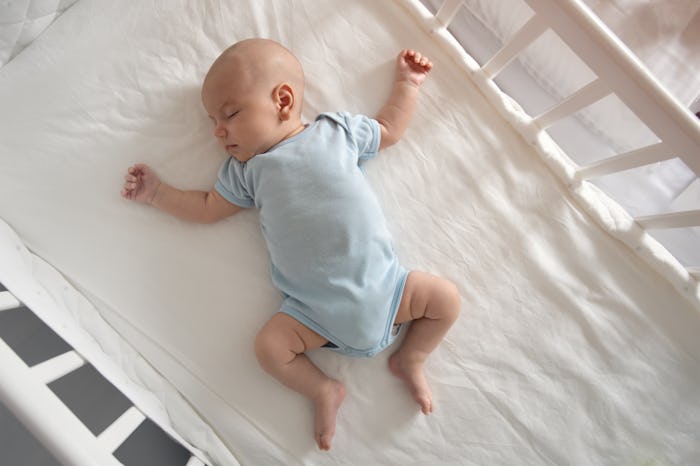Baby Sleep

Here's Why Your Baby Sleeps Better After Being Outside
If a simple walk is the key to a good night's sleep, I'm grabbing the stroller now.
Most babies are not great sleepers — it's kind of what they're known for. But while it may be a common complaint among parents, that doesn't make it any easier to deal with. When your little one is barely getting any rest, you're willing to do pretty much anything to turn the situation around. A quick internet search on how to improve baby's sleep can reveal one popular tip: Take them outside. Rumor has it that the fresh air and sunshine can make babies a little more sleepy. So do babies really sleep better after being outside, or is this one tip that sounds too good to be true?
Science says it's definitely possible. One small 2004 study in the Journal of Sleep Research looked at 56 babies younger than 13 weeks old to study their relationship between exposure to daytime light and their sleep at night. The study found that the babies who slept well at night spent twice as much time in the sunlight than the babies who weren't sleeping as well at night. Researchers believe that this is probably because the infants who spend more time outside established their circadian rhythms sooner.
These results make sense, Brittany Ferri, M.S., occupational therapist and founder of Simplicity of Health, tells Romper. "Circadian rhythms are our bodily clocks that keep us to a routine and regulate hormone production. This impacts a variety of things, like mood and appetite, but also sleep. Getting good sleep is dependent on the body's natural production of melatonin. Bright morning light — extending to daytime light as well — keeps our sleep patterns regular by making us feel sleepy earlier in the evening. Exposure to this early morning light is formative in essential production of melatonin at night. Since this usually happens around 6 to 7 p.m., it makes sense that this would help babies fall asleep earlier since this is typically their expected bedtime."
In other words, you need a sufficient amount of light exposure during the day so that your body's clock will produce melatonin at night. Bringing a baby outside during the day and exposing them to plenty of light is a great way to ensure their circadian rhythm is on point.
Not convinced? Taking a baby outside each day has other benefits aside from potentially increasing their nighttime sleepiness. Tanya Altmann, M.D., best-selling author and editor-in-chief of the fifth edition of Your Baby’s First Year, tells Romper, "Exposure to sunlight and fresh air daily, if possible, is always a good thing for babies and toddlers, and I recommend that my patients all spend time outdoors every day as long as it's not too hot or too cold." Altmann says this practice helps support immunity and sleep, and as your child grows, their own physical activity. If you're bringing a newborn outside, just always be aware of the temperature and pack the necessary items to protect them from hot or cold weather.
If you're unable to get outside each day (maybe it's way too cold, or you're still recovering from giving birth), you have another option. Altmann recommends trying to get your baby in as much indirect morning and afternoon sunlight as possible in the house. "Bringing the baby to sun-filled rooms, near a window, will help your baby eventually learn to distinguish between day and night, aiding in the nighttime routine," she says.
And if spending some time outdoors each day just isn't doing the trick, it's time to try some other things. Ferri recommends getting your little one on a daily sleep routine. "Babies — and all people, really — do best with routines, so forming a simple nightly ritual leading up to bedtime will help with falling asleep easier. This will also make it easier for your baby to fall asleep since they will know what to expect and can gradually ease into sleeping," she says. She also suggests putting baby down when they're slightly sleepy so that they can put themselves to bed.
For newborns who haven't yet learned to roll over, Altmann recommends swaddling for added comfort. "Swaddles are great for babies who have yet to learn to roll, as it mimics the womb-like feel, keeping baby cozy without dangerous blankets potentially covering his or her face," she says. Altmann also recommends using blackout shades to keep the light out of their room — you might want to expose them to light when they're awake, but definitely not when you want them to sleep. These suggestions can help your baby — and you — get some well-deserved sleep.
Experts:
Brittany Ferri, M.S., occupational therapist and founder of Simplicity of Health
Tanya Altmann, M.D., FAAP, best-selling author and Editor-in-Chief of the fifth edition of Your Baby’s First Year and medical spokeswoman for HALO